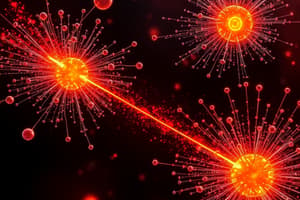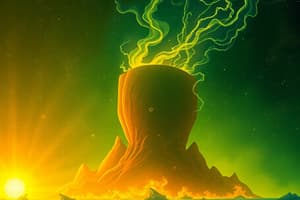Podcast
Questions and Answers
What were the light elements formed by?
What were the light elements formed by?
- Chemical reactions in the Earth's crust
- Electromagnetic interactions in space
- Nuclear reactions in stars (correct)
- Radiative processes in the Sun
What is conserved in nuclear reactions according to the text?
What is conserved in nuclear reactions according to the text?
- Temperature and pressure
- Total mass number and overall charge (correct)
- Volume and density
- Color and shape
What signifies a stable nucleus in terms of binding energy?
What signifies a stable nucleus in terms of binding energy?
- Neutral binding energy
- Low binding energy
- Variable binding energy
- High binding energy (correct)
How were the earliest stars formed?
How were the earliest stars formed?
What initiated fusion reactions in the clouds of H and He atoms?
What initiated fusion reactions in the clouds of H and He atoms?
What enrichment did nuclear reactions bring to the variety of matter in the universe?
What enrichment did nuclear reactions bring to the variety of matter in the universe?
Which of the following is the most abundant isotope of hydrogen?
Which of the following is the most abundant isotope of hydrogen?
What is the nucleon number of deuterium?
What is the nucleon number of deuterium?
What is the process by which light elements are formed in the universe?
What is the process by which light elements are formed in the universe?
Which of the following is not a light element formed through nucleosynthesis?
Which of the following is not a light element formed through nucleosynthesis?
What is the primary mechanism by which deuterium is produced in the universe?
What is the primary mechanism by which deuterium is produced in the universe?
Which of the following is the most common isotope of hydrogen in the universe?
Which of the following is the most common isotope of hydrogen in the universe?
What is the primary process responsible for the nucleosynthesis of heavy elements?
What is the primary process responsible for the nucleosynthesis of heavy elements?
Which of the following best explains why iron and nickel are highly abundant in the universe?
Which of the following best explains why iron and nickel are highly abundant in the universe?
What is the relationship between binding energy and mass defect, according to Einstein's theory of relativity?
What is the relationship between binding energy and mass defect, according to Einstein's theory of relativity?
Which of the following is responsible for the steady-state concentration of radioactive carbon-14 on Earth?
Which of the following is responsible for the steady-state concentration of radioactive carbon-14 on Earth?
What is the significance of the binding energy of a nucleus?
What is the significance of the binding energy of a nucleus?
What is the primary source of the carbon-14 present in the atmosphere?
What is the primary source of the carbon-14 present in the atmosphere?
Flashcards are hidden until you start studying




